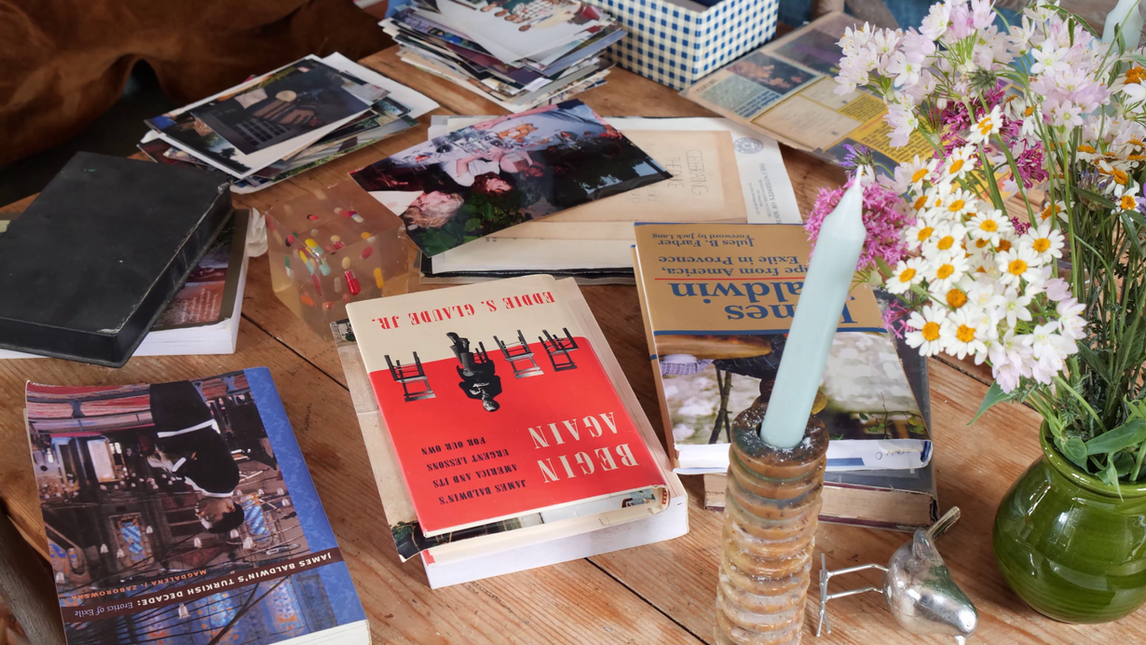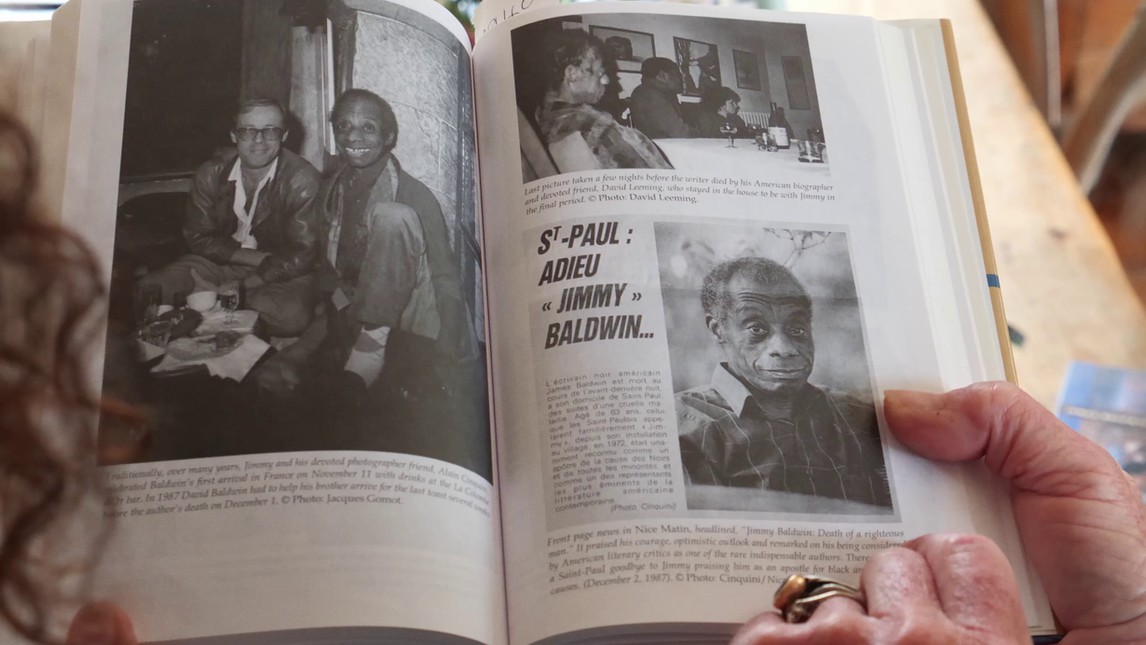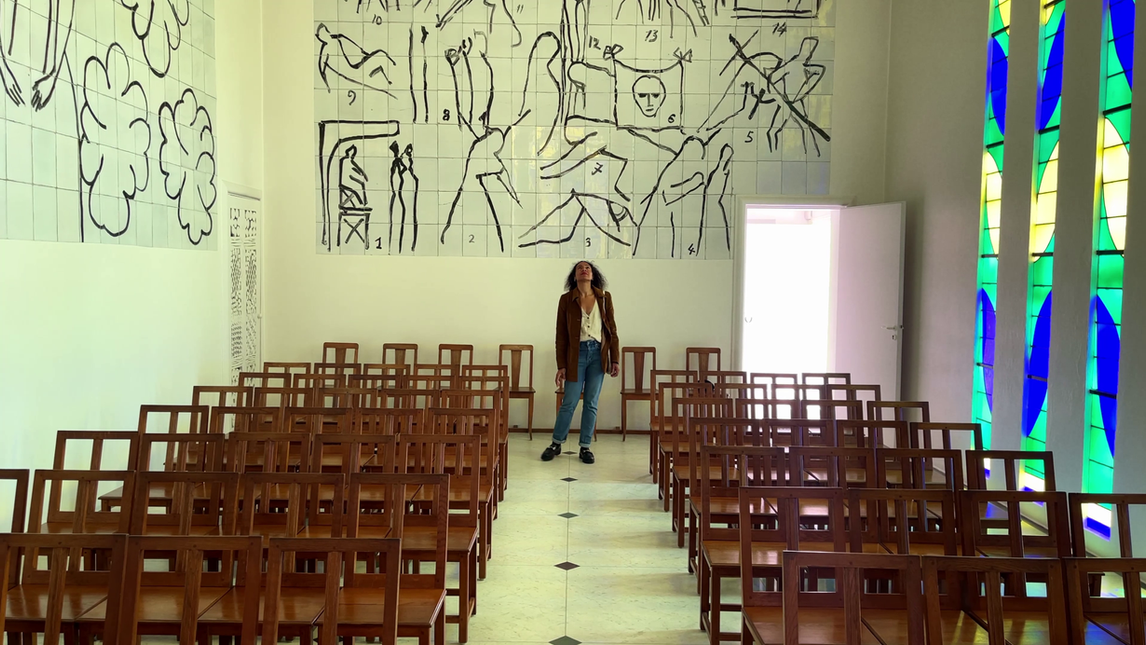top of page
Movement Song
2025, 96 min.

Heartbroken after a separation, young Caribbean researcher Noa watches her life unravel in Amsterdam. Dreams of a mysterious glass hammer lead her to Saffron, with whom poetry, radical theory and explorations of belonging spark a new intimacy. Movements instigated by this encounter take Noa to St.Paul-de-Vence in southern France, tracing the footsteps of James Baldwin. Grief led Baldwin there decades earlier, where he established his final homespace. The house is gone now, swallowed by a gated community of luxury villas. Yet Baldwin’s legacy endures; guarded by Jill Hutchinson, partner of Baldwin’s late brother, David. In Jill’s care, Noa witnesses how it is love that holds archive. Archive moves through love, enters bodies, and moves within. Grief, memory, and legacy arrive as guides, leading Noa to a new movement song.
Traces of an exile or a final home can be difficult to see on the surface due to erasure. Who is allowed to put down roots? Whose home is only temporarily tolerated? Whose tangible legacies are seen as worthy of protection? What makes an enduring homespace?
Movement Song is a fiction-documentary hybrid feature, weaving an experimental narrative form. Noa's journey from Amsterdam to Southern France halfway through the film unearths the documentary layer, as she encounters the tangible remnants of James Baldwin’s legacy: his typewriter, letters, LPs, Légion d'honneur, paintings, books, and more. This archive is preserved not in a formal institution, but in the intimate care of Jill Hutchinson, the beloved partner of Baldwin’s late brother David.
Noa arrives with the weight of her own grief, only to witness how Jill has been safeguarding the archive through grief and love. This encounter becomes a portal of healing, both for Noa, and for the trajectory of the film.

The research for Movement Song began when Mayıs Rukel traveled to St.Paul-de-Vence in 2022, to trace the legacy of James Baldwin, while on a grief pilgrimage of his own. Known as a writer who lived much of his life in exile, Baldwin had chosen St.Paul-de-Vence as a rare site of belonging. He had hoped the house would become a writer’s retreat for the African diaspora writers after his death. But the estate was claimed by developers, demolished, and replaced by gated luxury residencies.
During the research process, Mayıs Rukel connected with Baldwin scholar Magdalena J. Zaborowska, professor at the University of Michigan and author of Me and My House: James Baldwin's Last Decade in France and James Baldwin's Turkish Decade: Erotics of Exile. Zaborowska generously shared access to her archives and extended her network, offering photographs of Baldwin’s home before its destruction and facilitating contact with Jill Hutchinson. In May 2023, Jill agreed to take part in Movement Song and welcomed Mayıs and Victoria into her home in Vence.

When Mayıs Rukel and his collaborator Victoria McKenzie arrived in Vence to film the archive, they immediately recognized that it requires a deep engagement. How does one engage with a personal, living archive within a framework of reciprocity, care, and decolonial ethics, as opposed to extractive archival methodologies? This question led to a key formal decision: the visual narrative of the film would center Baldwin’s objects and traces, while the audio would be grounded in Jill’s voice and stories. Her reflections, spirit, and presence form the heart of the film. In honouring the person who holds the archive, Mayıs and Victoria moved away from institutional logic and toward relational ways of holding and transferring stories.

The fictional character Noa's inner journey, marked by heartbreak, queer desire, and spiritual searching, mirrors the emotional stakes of Baldwin’s archive. The title Movement Song is borrowed from a poem by Audre Lorde, the Black lesbian spirit mother of the film. Through Noa’s eyes, we encounter personal and collective memory, the erotic as power, and grief as an instigator of transformation. Her journey lays the emotional groundwork upon which the documentary segment rests.

Throughout the making of the film, Mayıs and Victoria formed meaningful connections. In addition to Magdalena Zaborowska and Jill Hutchinson, they befriended Georges Matisse, the great-grandson of the artist Henri Matisse, who granted them rare permission to film inside the Chapelle du Rosaire in Vence; a significant cultural monument where filming is normally strictly prohibited. These constellations of trust and generosity helped transform Movement Song into an archive in its own right.

Filmed across the luminous landscapes of southern France, and partly beholding the magnificent mountains of Spain, Movement Song is a meditation on grief, love, and the legacies we leave behind. It is a love letter to the guardians of memory, those who hold the archive in the intimate care of their brilliant hearts.

Movement Song Film Poster by Mayis Rukel and Victoria McKenzie
May 2023 as Movement Song unfolded


















Film by
Mayıs Rukel
Victoria McKenzie
Written and Directed by
Mayıs Rukel
Writing Participation by
Victoria McKenzie
Sabrina Miller
Jules Davis-Dufayard
Featuring
Victoria McKenzie as Noa DaCosta
Sabrina Miller as Saffron Williams
Jules Davis-Dufayard as Jules
Anna Raiola as Anna
Mira Thompson
Jill Hutchinson
Joni
Sean-Claude Barnaby Neufville
Lina Bravo Mora
Mar Maiques Diaz
Effy Fu Yuanyuan
Jerrold Saija
Emma van Bokhoven
Ro Buur
Cinematography, Edit, Colour-grading, Sound Design by
Mayıs Rukel
Original Piano by
Patrick Walinga
Sound Mix and Mastering by
Rick Haring
3D Design by
Teun Grondman
Autoharp by
Mayıs Rukel
"Memories Collection" by
Mira Thompson
Electric Guitar by
Kyle Mr. Hat
Falling Shark Dream Seen by
Effy Fu Yuanyuan
Glass Hammer by
Mayıs Rukel
James Baldwin's St.Paul-de-Vence house images are courtesy of Magdalena Zaborowska: "Chez Baldwin Writer's House Digital Collection" University of Michigan Library Digital Collections
James Baldwin interview Mavis on Four video excerpt courtesy of Fremantle
Gratitude for
Jill Hutchinson, for love and trust
Victoria McKenzie, Sabrina Miller, Jules Davis-Dufayard
for brilliance, patience and friendship
Magdalena Zaborowska, for generously sharing information, creating connections
Camille Barton for the gift of Ecologies of Transformation, for the grief toolkit
Cohort of EoT
Char Kasza for teaching the Resilience Toolkit (Nkem Ndefo - Lumos Transforms)
Mar Maiques Diaz and Kai Cheng Thom for conflict transformation wisdom
Joy Mariama Smith for two years of somatic integration and liminal objectives
belit sağ for loving guidance through thesis research
Angelo Christiaan and Nagare Willemsen for holding our space with care
Georges Matisse, Gwenaelle Fossard and Sister Bernadette Fabre for granting us filming permit inside La Chapelle du Rosaire of Matisse
Rietveld and Sandberg Library for allowing our mess
Medialab Ineke Bakker, Ivo van Stiphout, Ramon Coelho for support and kindness
Michael & Luc Tombeur for support in St.Paul-de-Vence
Patrick Walinga for love, care and genius
Grief, for feeling again
bottom of page


























